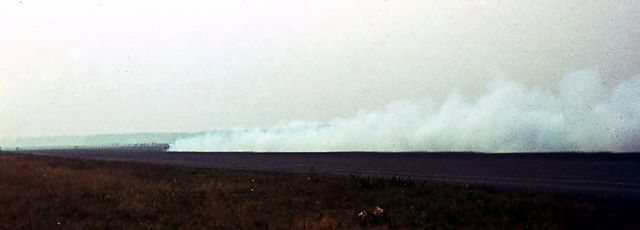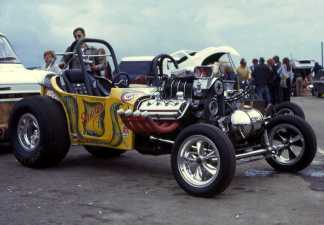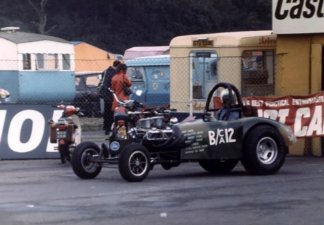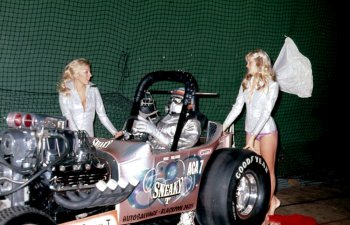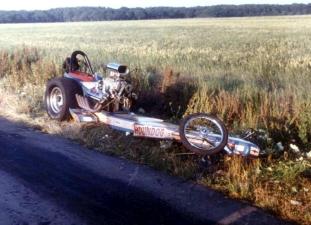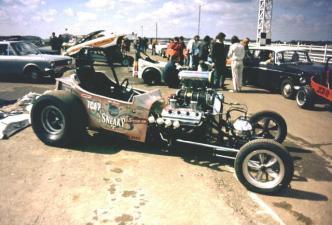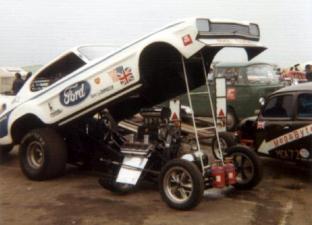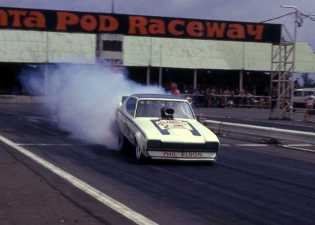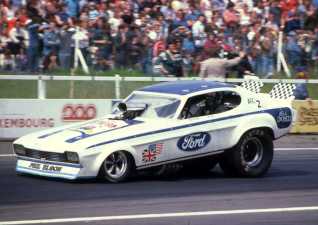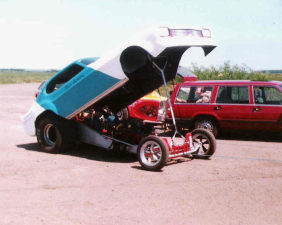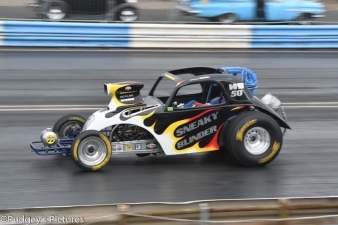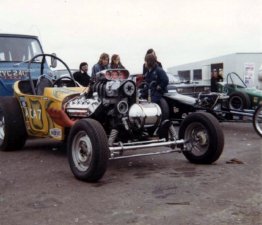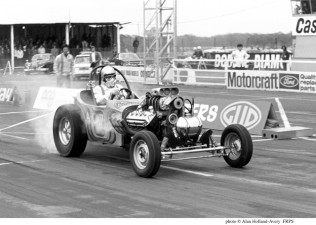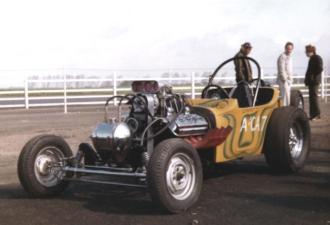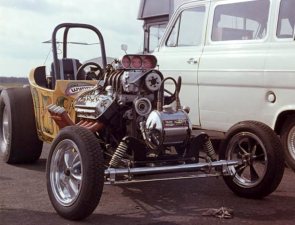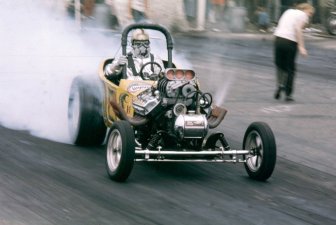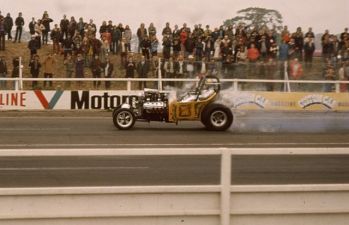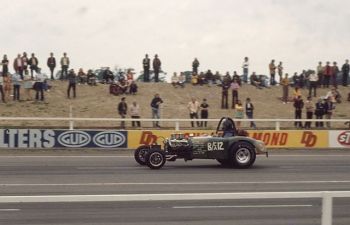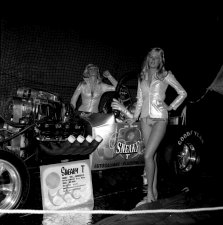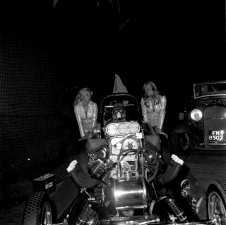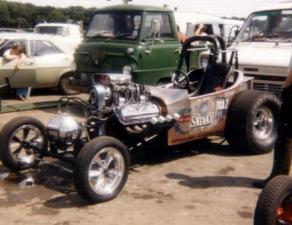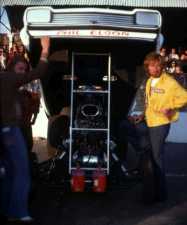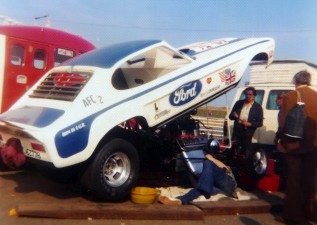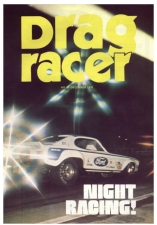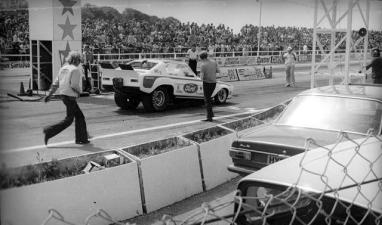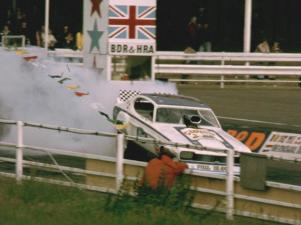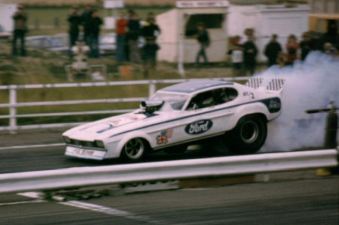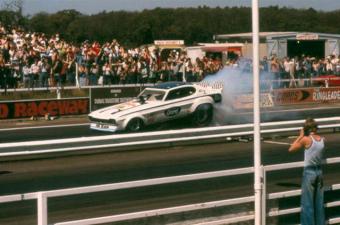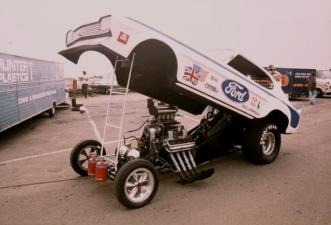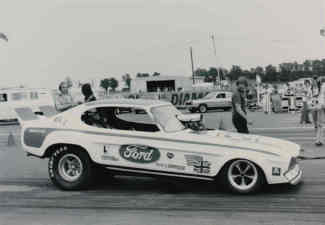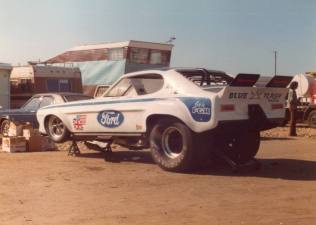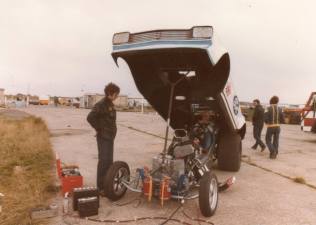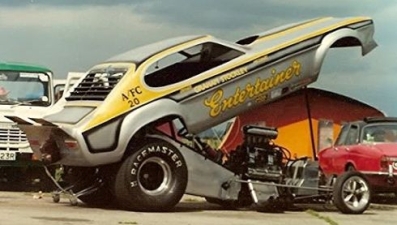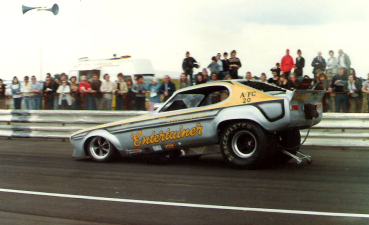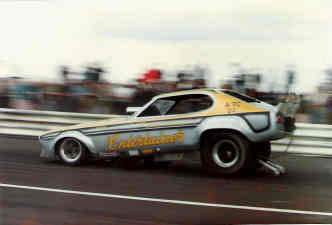
As told exclusively to The Phil Elson story is from an interview with him on 10th June 2015, by Simon Groves and Dave Riswick, to whom we are grateful for making arrangements and providing material which we have used to add to the story. The late Phil Elson worked on aviation technology in World War II which gave him engineering skills. Following a trip to the Drag Festival at nearby Woodvale in 1964 and 1965, Phil built his own car Lil Daf which he ran in 1968. He realised the limitations of Lil Daf and built a new chassis and used a Rochdale body for 1969, calling it Sneaky. Feeling the need to go quicker he bought a race ready blown Hemi and fitted it to the car in 1971. Phil acquired a Model T body for his existing chassis in 1972, replacing the chassis with a Mark Stratton built one in 1973. In 1974 his Hemi engine blew but an opportunity came at the same meeting to fit the engine out of the Houndog slingshot dragster. 1975 was another change as FGR built a Capri Funny Car for Phil using the existing engine, modifying his chassis and fitting the repaired Gloworm body from Roy Phelps' old FC. The car was so well built that it raced on for several years and the chassis gave service as a basis for a Wild Bunch car in the 2010s. Phil sadly died in 2021 and although his machines weren't record breakers, they gave great entertainment and always looked good. I worked Coventry in the war, I started working on the 16 cylinder radial Hercules sleeve engines then went on the Lancaster bombers and made the rear gun turret and rudder bars. There was a lot of bombing of the houses, I remember seeing a landmine swinging off a parachute on a lamppost. We got out of the way quick. I used to race a speedboat at Chasewater in the Midlands in 1950s. We only entered one race which we won but never entered again. Later I used to run a guest house in Blackpool which I had for 14 years. I picked up the paper and found it was for sale and that was it, I bought it in 1962 and we moved there.
I first got into drag racing by going to Woodvale in 1964/5 and seeing Buddy Cortines do 200mph. I saw that and decided to build my own. My favourite US racer was Willie Borsch, although I never saw him race in the US. I built the first car in 64-65 and raced it at Santa Pod in 1968. It was like a tank with a 3” box section chassis. When I took it there they said it was too heavy so I went about lightening it. I bored holes in the chassis to do that. It was the first one to have that, it was a box chassis and the holes in it lightened it a lot. The front axle came from a taxi with Herald springs. The suspension was my design, we used that on every car after Lil Daf. It was a coil spring, the mounts were rounded off. The body was a one-off that had to be replaced with a new one when rules demanded the use of a recognised body in the altered class.
It was fitted with 11.00x16.00 Goodyear Dragway slicks, huge for the time, which had been delivered by Paul Manders, who lived near me in Blackpool and picked them up from one of the AA/Fuel teams at the 1965 Drag Festival. It was called Little Daf by my youngest daughter. We were trying to get it started in a car park where we lived in Blackpool, it jerked and set her off and she called it Little Daf, I don’t know why. I built the chassis and did my own engine work for the car. It had a 272ci Y Block Ford with single bbl Rochester carb which was originally with the engine. A friend had a Morris Minor and we learned by polishing the head and porting them, and it was sponsored by Wynns Friction Proof, we were the first to have that stuff in the 1960s. The 272ci engine blew up when we ran the car at Ipswich but it so happened that a 292ci Y Block was in my mate Dave Payne’s new dragster. We had to rebuild the chassis to make the engine fit and, after it failed on its first fire up, the engine was rebuilt and upgraded to 312ci. It had an Isky ¾ race cam and 4 barrel carb with which it ran 11.8 in a Falcon kit car body at its first meeting out in August ‘69. It was called Sneaky and we called ourselves Blue Flash Racing. Marty Babb recalls: Phil's modified Austin LD van used to push start and transport the car. The rear was extended to make room for the altered, the extension being longer than the wheelbase of the van!
In 1971 I sold the 292ci engine to a street rodder in Norfolk for a Ford Pop and I got my first Hemi which was a supercharged 392 from US racer Ron Ellis’s Instant T altered. It had run 7.59 in the altered but previously had gone 6.59 in a dragster on a 95% nitro load. It was brought over by Asmodeus driver Bill Weichelt and arrived built up but we had to work on it as it wasn’t happy running at first. It had Donovan heads and valvetrain with a Cragar blower and Enderle fuel injection, Mickey Thompson rods and pistons, Crower cam and Scheifer magneto. It had a twin plate Scheifer slipper clutch which transmitted the power to the Goodyear 8x15 slicks. The Hemi went into our Blue Flash Falcon, firing up at the Elvington speed weekend in 1971 and coming out at Santa Pod for four events that year. In 1972 I bought a model T body, fibreglass, made by Beaujangle, a fibreglass shop in Dagenham and used on the old chassis. The car got down to 9.1s which was pretty good for a 3.3:1 rear axle ratio.
I had a new chassis for 1973 welded by Mark Stratton who I visited regularly on my way home from Santa Pod. I bought the necessary metal and got a local blacksmith to bend the 1 7/8” roll cage tube. Then I called Mark up to Blackpool for the weekend, working from Friday night to Sunday. Mark welded as I cut the tubing to length and by late Sunday we had a rolling chassis based on 1” square box, which two members could lift. The front axle was a straight moly tube with E93A spindles and Lambretta coils. The front wheels were the five spoke American Mags from the crashed Transcontinental funny car, and the steering utilised a Standard 10 box. The rear brakes were Airhart 500 four caliper discs aided by an Irvine chute. I named the ’73 car Sneaky T because I used to creep up on them, although I had lettered Sneaky on the rear of the Blue Flash car as well. It had a pair of new 15x10 American wheels on the back and was wild at the top end. We then discovered 2lbs of lead had been placed in one rim from its previous owner. There were much bigger 15x14 ½ ex Jenkins Goodyear slicks at the rear too which kept it lively under braking. The rear axle on Sneaky T was from the crashed Transcontinental Funny Car. It had a 4.11 ratio and was narrower than the T body which then had to be narrowed by 3”. The engine had some fantastic Ed Donovan-ported heads which helped get the time down to 8.7/167. I won the Nationals at Santa Pod in both 1972 with Blue Flash and in 1973 with Sneaky T and won the Castrol/Custom Car Championship in 1972. I only used 10% nitro. You could get instant speed by upping the percentage but you risked blowing it up so we stuck to 10%. At the bonfire meet they asked us to do a fire burnout, it was what the crowd wanted to see. That meeting we got ready to do the flames out of the exhaust. Dennis Stone said 'You've put the nitro up', but all we did was change the mag to around 36 degrees. He tipped the can but blew his engine. We were careful on parts. I had the same bearings on the engine for three years and two sets of plugs. However the hemi expired in July 1974 and we got the engine from Houndog 6 slingshot after Harold Bull had crashed it on a test run at the same event. I had sold the Blue Flash car to Freeman Rogers who ran it as Aardvark with a 427 Ford lump from a Galaxie; it was run by Freeman, Pete May, Fred Klein and Roger Stout all stationed at USAF base Upper Heyford. It then used the ex-Commuter blown Ford motor in '74 but by the end of the year had gone back to the un-blown motor The chassis was sold to Mike Kason and became Kerbdozer. Mike then sold it to Keith Potter at the end of 1975 who renamed it The Devil, running it successfully for many years. I can only remember my mechanic’s first name. One was called Van Dave, from Blackpool (Dave Payne). His mates built a car, they found out I was already racing and they didn’t do any more. He died years ago from a heart attack, it was in his family, I was just preparing to do a burnout, Dave, the mechanic, he always stood behind, the parachute clip came out, he caught it, everyone was yelling at him and he just stood there with his arms full of chutes. I went to Funny Car because they wanted to drop Top Comp Altered. Roy offered me the Gloworm body to place on the altered chassis. I had said we weren't so keen on doing it and Roy said why don't you have the Gloworm body. It was the original Gloworm body, altered by the lads at FGR who did the painting, not Allan Herridge because he worked on the chassis. The FC was called Sneaky Gloworm. The original Gloworm had been damaged at Walthamstow dog racing track, In one burnout there was too much water one side and the tyre the other side grabbed and it went sideways. FGR would have been able to repair it but the chassis was too heavy. So we extended our Sneaky T chassis. Roy and his team did all the conversion work from Altered to FC and they were modest in not saying they did that.
We had to wait for the Capri to turn up from FGR then we fired it up and it went 8.1s on its first run. There were no ties with it and they sponsored us with fuel. Driving the funny car felt like a Sunday drive, a lot straighter. I used to have no opposition to running drag racing every weekend and my wife ran the guest house and came down and served tea. I called in at Mark Stratton’s on the way back, he built several drag cars in the 1960s and we talked about the engineering of them. Then my wife looked after the Pod Shop at the track and then we opened up a shop in Blackpool selling various parts. We took our dogs to the strip, they were in the Pod Shop near the start line, and they went into the cornfield but you couldn’t see them, they were small dogs and you could only see them when they jumped up. We took the car to a lot of shows including the Custom Car Show at Crystal Palace in 1971 and again in 1974 taking Sneaky T with its new paint job where it picked up the Best Comp Altered Trophy. We also went to Belle Vue in Manchester. One year we ran 14000 miles in 12 months. My grandson Paul used to go down with me. He was about five or six and sat on the exhaust pipes. He now lives in Irvine, California. He sent me two hats from Pomona. He's got two sons and his ten year old son, my great grandson goes to drag racing regularly over there. I last went to Santa Pod in 1985 from what I have seen, a lot has changed! What happened to Sneaky Gloworm? Phil last ran the car as driver in the July 1977 Summer International at Santa Pod. For the September 1977 meeting Ronnie Picardo was driver for a one-off. Then by May 1978 Roland Chaplain took over the controls with the crew at that meeting being Phil Elson, Dave Payne and George Milligan.
Graham Stockley, based near Phil in Blackpool (no longer with us), bought the Ford Capri Funny Car complete and ran it as the 'Entertainer' in Pro Comp starting in August 1980 at a Long Marston meet run by the NDRC Midlands and Banbury Drag & Custom Club. Roy 'Spiderman' Webb then bought it and renamed it ‘Sneaky Spider’, initially running it in Comp Altered in 1984 still with the ageing blown 392 which had started life in Firefly in 1971. It was then seen in the hands of Coventry based racer and former track marshal Nick Sephton running a 3.5 Rover lump called 'The Reaper'. Jerry Cookson recalls Nick telling him that they were not going to use the Ford body for future events as it was a heavy old thing and took too many people to take on and off, so Nick put a Reliant Robin body on the chassis. From the mid 1990’s the chassis was sold on twice more passing from garage to garage before Steve and Heidi Yardley from Dudley, West Midlands got hold of it in March 2016. After totally rebuilding the car and putting a Topolino body over the chassis, Steve thought that it was time the name Sneaky was brought back into the cars history….hence Sneaky Blinder, after the hit BBC show Peaky Blinders. Steve Bingham was the driver. Gallery: click on any thumbnail for a large image.
Back to pioneers index Back to News page |

